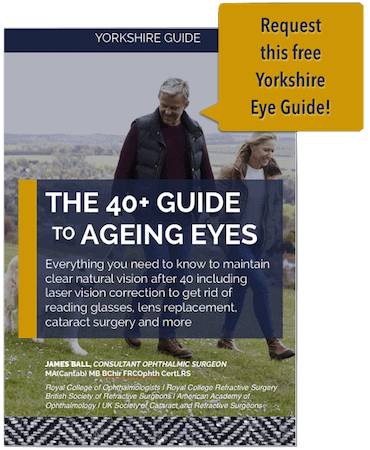
How successful is lens replacement?
Many patients ask: “How successful is lens replacement?”
Well, as a tool for decreasing dependence from spectacles, it’s incredibly powerful with the lens technologies that we have available. What I’ve found is that I can get ninety-percent of patients’ completely independent from spectacles after lens replacement.
The remaining ten-percent tend to need reading specs for reading very small print or trying to read for extended periods of time, particularly in dim light conditions. That is typically when patients are trying to read; in the evening, they’re tired, the lights are down low and their eyes might be a little bit dry. But even those patients have an extraordinary level of social independence from spectacles. By that, I mean excellent distance vision, driving, seeing television comfortably without spectacles, reading the menu in a restaurant, they can go shopping, socialise with friends, play golf and see a school card, etc. So even these patients, who are occasionally using readers, are very happy and they have a really good range and level of focus.
There are patients who tend to need a bit of support. The things that can sometimes hold them back with visual performance is a bit of dryness, but we can pick it up beforehand if they have a dry eye tendency. So, I can warn patients in advance if they’re more likely to need some help with readers afterwards. And sometimes, if there is some other eye condition, like with some of my older patients, sometimes I’ll find that they have some changes in the back of the eye (in the retina), completely unrelated to the lens replacement. Identifying those changes forms part of our really careful assessment in the clinic. For some patients, actually, I can’t use multifocal lenses for them and for some patients, we can use it and it means that the performance mode won’t be the quite same level as somebody who is lucky to have a completely healthy retinal function.
As with all the work we do, it is about the careful examination, assessment and customization of the approach. With that approach, it’s an extremely powerful and successful tool for decreasing dependence of spectacles for our patients. As to when I choose lens replacement surgery or laser eye surgery because we have a PRESBYOND blended vision which is also very good for providing a range of focus for this age group of patients. This age group of patients (where their own natural lens isn’t working so well) they have presbyopia and have lost that range of focus. It really comes down to the prescription, tear film and the changes in the lens inside the eye. If a patient has a crystal clear lens, great tear film and quite a small prescription, then laser eye surgery is awesome. Conversely, early cataract change and some significant dry eye, lens eye replacement is a great technology.
So, as ever, it isn’t that one procedure is brilliant and the other one is terrible. They are both excellent but we have to apply it appropriately to the right patient and that’s what we put a lot of work into in our clinic. We organise and set up the whole process that we put in place to assess and look after our patients.



